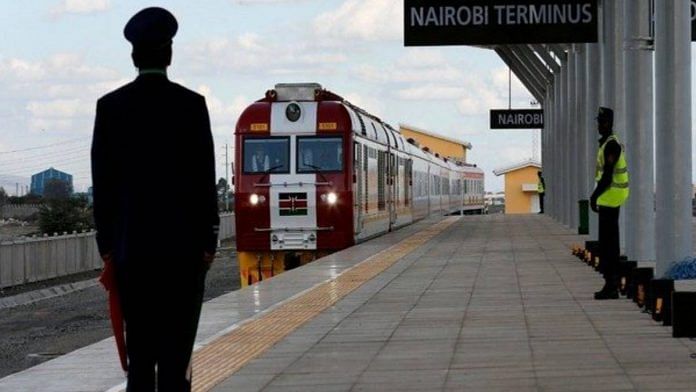New Delhi: The Kenyan government has published partial accounts of a controversial railway contract signed with China in 2014, fulfilling a central campaign promise of newly elected President William Ruto.
Built at a huge cost of $4.7 billion, the railway line, known as the Standard Gauge Railway, has been marred by corruption scandals and criminal allegations, has overshot budget estimates by millions, and engulfed the East African country in debt via high interest rates.
Data from the Kenya National Bureau of Statistics shows that the country owes more bilateral debt to China than to any other state.
Significantly, in 2020, a Kenyan appellate court declared the rail contract between Kenya and the China Road and Bridge Corporation to be illegal.
The standard gauge train runs from the coastal city of Mombasa, through the capital of Nairobi, and ends abruptly in an “empty field” in Rift Valley, about 320 km from the originally envisioned end destination in the neighbouring country of Uganda. When Kenya struggled to pay up loan installments as construction progressed, Beijing pulled the plug on extending the track to Uganda.
The partial accounts made public Sunday by Kenya’s transport and infrastructure cabinet secretary Kipchumba Murkomen reveal the asymmetries inherent to any development financing project with China, specifically those part of the Belt and Road Initiative.
Also read: Climate challenge and ‘Chinese-style modernisation’ aren’t at odds with each other for Xi Jinping
Sweeping powers to China, high interest rates
The published documents specifically highlight the sweeping powers the contract gave Beijing, including holding all dispute arbitration in China and making it essential for Kenya to first approach China while purchasing any goods from the revenue generated through the train. Further, the contract also mandated that details of the deal not be made public without clearance from China.
The documents also reveal that interest rates from the Export-Import Bank of China, the main financier of the project, were far higher than the usual rates for government-to-government contracts.
According to a report in The New York Times, “The agreement also stipulated that if Kenya defaulted on any other external loan, the default clause on the railway loan would automatically kick in, forcing Kenya to repay the loan and all accrued interest immediately and giving China the right to cease further disbursements.”
“Whether the project pays for itself or defaults, the financiers are guaranteed their return,” said the report, quoting economist Tony Watima from Nairobi, assessing from the published documents.
High interest rates and short-term maturities are central to China’s development financing across the world — as seen in the debt-inducing nature of China’s investment in the Gwadar Port in Pakistan and Hambantota Port in Sri Lanka, both of which are now on lease to China, since the host countries could no longer pay back the loans.
Lawmakers want complete disclosure
The railway line contract, originally signed by the government of previous Kenyan president Uhuru Kenyatta, had been strongly defended by current president Ruto in the past. However, mounting controversies with the project made the ruling elite of Kenya change their stance.
Though the partial accounts of the contract will be tabled in Kenya’s Parliament, reports suggest that Kenyan lawmakers are now demanding that the complete contract be revealed. Specifically, The East African reported that details of the collateral put up by Kenya for the deal are missing from the published documents.
Earlier, this year, Quartz had reported: “Kenya has declined to make public the loan contracts for its Chinese-built railway in response to a court petition by two activists, saying they have non-disclosure clauses and that releasing them would amount to breaching a bilateral agreement, impairing relations between Kenya and China.”
(Edited by Nida Fatima Siddiqui)
Also read: No investment in Russia, dip in Pakistan, pivot to Saudi — China’s BRI takes a turn



